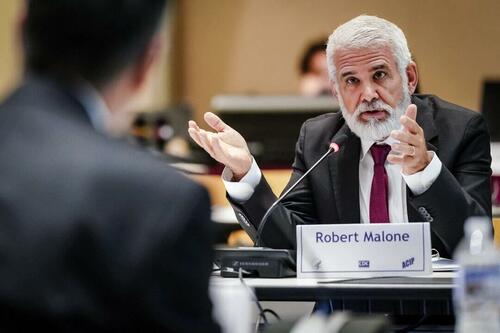Authored by Zachary Stieber via The Epoch Times (emphasis ours),
An adviser to the Centers for Disease Control and Prevention (CDC) who voted in favor of a respiratory syncytial virus antibody for infants says new data that has come to light indicates that the vote was based on presentations that omitted crucial information.
“It appears that this decision was based on manipulated data analyses,” Dr. Robert Malone, a member of the CDC’s Advisory Committee on Immunization Practices (ACIP), said in a blog post on Aug. 20.
Malone and four other members of the panel in June voted to advise the CDC to recommend the antibody called clesrovimab for infants to try to prevent respiratory syncytial virus. Known as RSV, the virus typically causes mild symptoms such as a cold but can, in some cases, lead to severe problems and, according to the CDC, is a leading cause of infant hospitalization.
Two members voted to advise the CDC not to recommend clesrovimab.
The vote followed presentations by CDC epidemiologist Adam MacNeil and Dr. Matthew Daley, who works closely with the CDC and is a former member of ACIP.
MacNeil said in his presentation that there was no increased risk for seizures in infants in 2024 and early 2025 who received nirsevimab, the only antibody available to infants at the time, based on data from the CDC’s Vaccine Safety Datalink. Daley provided more information, summarizing the study of information from the data system. That included a finding that when splitting infants into two subgroups, aged zero to 37 days and 38 days to just younger than 8 months of age, there was not a statistically significant risk of seizures.
“These are truly remarkable products,” Dr. Cody Meissner, an ACIP member who studied them as part of a committee workgroup, said after the presentations and before the vote. “They are safe and they’re effective.”
Malone said before the vote that “concerning this product, it has been very actively debated internally and I’m satisfied that, given the short period of time we have to address this, that I’m comfortable that we have sufficient information.”
Retsef Levi, one of the no votes, said that he was voting no “based on the fact that I don’t feel this is ready to be administered to all healthy babies” and how he wanted to take a more precautionary approach.
The presentation did not include a pooled analysis or seizures from the combined infant population.
Maryanne Demasi, a journalist and researcher who holds a doctorate in rheumatology, later performed an independent analysis of the seizure data, pooling the two infant populations. She found that infants who received nirsevimab were four times more likely to suffer seizures.
Malone said on Aug. 20 that, based on that new information, as well as other concerns raised about the presentations, such as the lack of inclusion of data from other government-run safety systems, it appears that his vote in favor of the new antibody “based on the information and logic presented” was actually “on manipulated data analyses.”
“That trust in the data presented now appears to have been ill-advised. Going forward, speaking for myself, based on these findings, I will no longer be able to trust that what is presented in CDC summaries to the ACIP is transparent, accurate, and unbiased,” he said.
Levi told The Epoch Times in an email that “we all need to aspire to higher level of transparency and deeper discussions of potential safety signals.” He declined to comment further.
Other members did not return requests for comment or could not be reached.
Merck and AstraZeneca, which manufacture the antibodies, did not reply to requests for comment.
The CDC and Daley did not respond to inquiries.
“Dr. Malone was speaking in his personal capacity on his own blog, outside of his responsibilities as an ACIP member,” a spokesperson for the Department of Health and Human Services told The Epoch Times via email. “ACIP remains committed to evidence-based medicine, gold-standard science, and common sense.”
The department, the CDC’s parent agency, is headed by Health Secretary Robert F. Kennedy Jr., who appointed Malone and others to the ACIP after removing the existing members.
Dr. Jake Scott, a clinical associate professor of medicine at Stanford University, wrote on X that he did not agree with concerns about the presentations.
Pooling the subgroups of infants should not be done, he said, because most infants in the first group did not receive vaccines at the same time as the antibody, while many in the second group did.
“Vaccines are well-established fever triggers, and febrile seizures are documented vaccine side effects. When you pool newborns who got minimal vaccine exposure with 2-month-olds receiving … vaccines, you’re not measuring nirsevimab effects, you’re measuring vaccine-induced fever effects and misattributing them to the antibody,” Scott said on X.
During the ACIP meeting, Daley said 20 percent of the younger age group received hepatitis B vaccines on the same day as nirsevimab, while 84 percent of the infants in the older group received simultaneous vaccination of various shots.
“So essentially the safety evidence that I presented yesterday, in particular for that group who were 37 days to less than 8 months of age, does represent safety with simultaneous vaccination,” he said.
Loading recommendations…

















